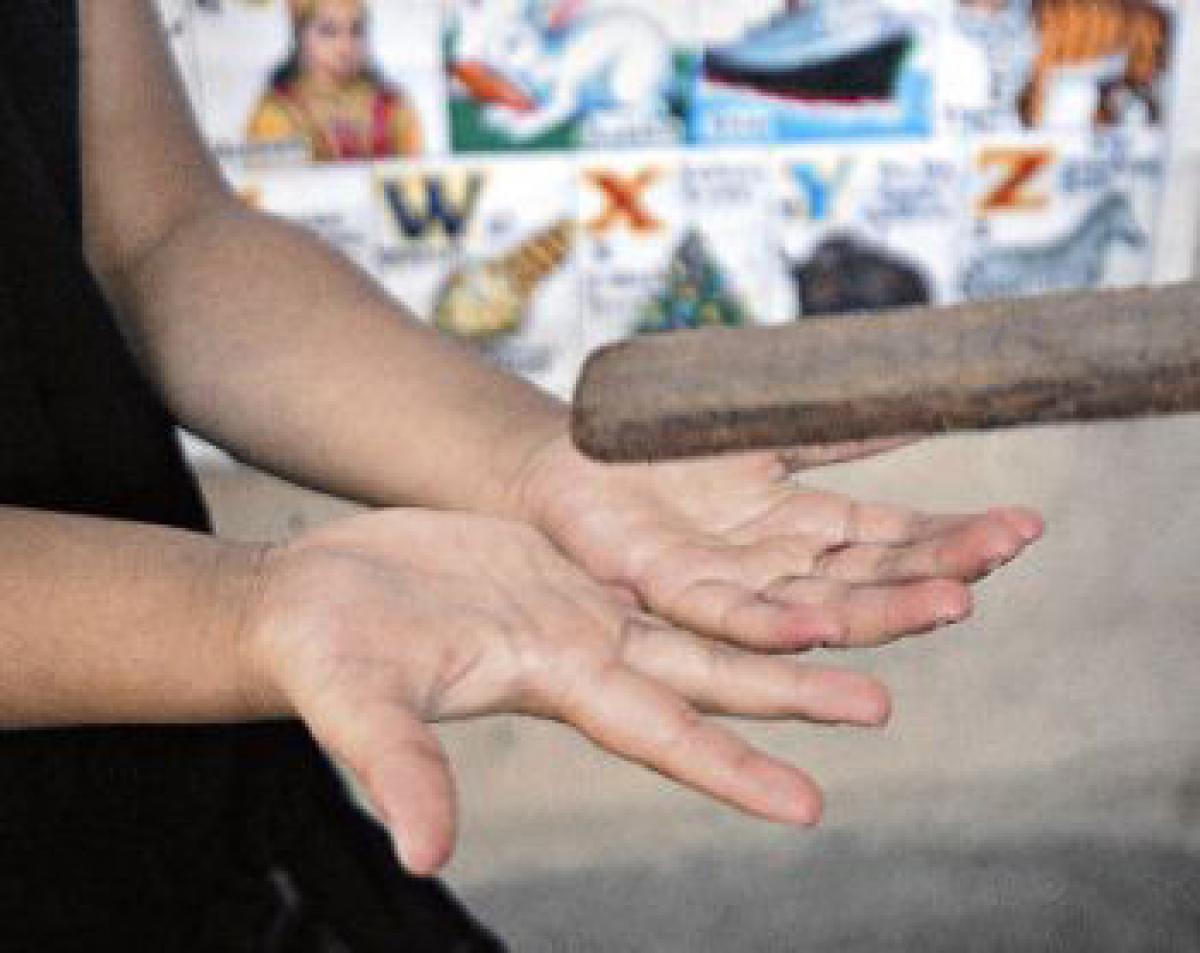Sky does not fall if children cannot be hit

Sky does not fall if children cannot be hit. Corporal punishment is a necessary part of upbringing. Children learn from a smacking or beating to respect their elders, to distinguish right from wrong, to obey rules and work hard.
.jpg) Busting myths of corporal punishment
Busting myths of corporal punishment
The National Commission for Protection of Child Rights (NCPCR) demolishes the common defences of the extreme form of punishment in educational institutions and at home and advocates abandoning the practice forthwith in overall interests of children
Corporal punishment is a necessary part of upbringing. Children learn from a smacking or beating to respect their elders, to distinguish right from wrong, to obey rules and work hard. Without corporal punishment children will be spoilt and undisciplined Everyone needs discipline, particularly self-discipline. But corporal punishment is not a form of inculcating discipline.
Research has consistently shown that that it impedes the attainment of respect for discipline. It rarely motivates children to act differently, because it does not bring an understanding of what they ought to be doing nor does it offer any kind of reward for being good. The fact that those parents, teachers and others have to repeat corporal punishment for the same misbehaviour by the same child testifies to its ineffectiveness.
In the countries where corporal punishment is banned, there is no evidence to show that disruption of schools or homes due to children has increased. This indicates that disruptions everywhere are conveniently blamed on children as they are the most vulnerable. The sky does not fall if children cannot be hit.
Research clearly shows that effective control of children’s behaviour does not depend upon punishment for wrongdoing but on clear and consistent limits that prevent it. Therefore modeling and exhibiting behavioral standards necessarily depends on adults. Nurturing a child’s behaviour is like growing a fruit. Its quality depends on the inputs. In nurturing a child these inputs are love, tolerance, motivation and encouragement coupled with ease of pace to learn or perform.
I was hit as a child and it didn't do me any harm. On the contrary I wouldn't be where I am today if it were not for my parents and teachers physically punishing me. Corporal punishment alters and destroys self-perception of the victim. People usually hit children because they themselves were hit as children: children learn from and identify with their parents and teachers.
It is pointless to blame the previous generation for hitting children because they were acting in accordance with the general culture of the time; nor should bonds of love and gratitude which children have towards their elders be denied. However, times change and so also social attitudes with them.
There are plenty of examples of individuals who were not hit as children becoming great successes, and even more examples of individuals who were hit failing to fulfill their potential in later life. Parents often hit out of anger and frustration – children, like adults, can be very wearisome and difficult – and because they have no knowledge of alternative methods. Parents who try alternatives report success.
I’d bet that if you asked children how they’d like to be punished they would choose corporal punishment. Children have a natural tendency to defend their childhood. If the influential adults in a child’s home and school life use corporal punishment, it is not surprising that some children may at first defend its use. You don’t want to think badly of your parents.
The child learns that he or she deserves a beating and that it is a necessary part of growing up. But attitudes will change if children are enabled to reflect on how they felt when punished and are introduced to positive approaches to discipline built on respect, rewards and companionship. Parents' right to bring up children as they see fit should only be challenged in extreme cases, like child abuse.
The UN Convention on the Rights of the Child replaces the concept of parents’ rights with “parental responsibilities,” including the right and responsibility to protect the rights of children themselves. The assertion of children's rights seems an unwarranted intrusion to people accustomed to thinking of children as parents’ possessions, but children are now recognized as individuals who are entitled to the protection of human rights standards along with everyone else.
Other forms of inter-personal violence within families – including wife-beating – are already subject to social control and are unlawful in almost every society. It is quite wrong that children, the smallest and most vulnerable of people, should have had to wait until last for protection. There is a big difference between a vicious beating and the little smacks that parents often give their children. These are not dangerous, do not cause real pain and cannot be called abuse.
Why should these be outlawed?
First, the little smack does cause a child pain and is intended to do so. And sometimes "minor" corporal punishment causes unexpected injury. Hitting children is dangerous because children are small and fragile (much corporal punishment is targeted at babies and very young children). Ruptured eardrums, brain damage, and injuries or death from falls are the recorded consequences of "harmless smacks".
People would no longer get away with condemning violence to women, by defending "little slaps". I only smack my children for safety - for their own sake they must learn about danger. If a child is crawling towards a hot oven, or running into a dangerous road (likely to cause risk to them) of course you must use physical means to protect them – grab them, pick them up, show them and tell them about the danger.
But if you raise your hand to hit them, you are confusing them– by hurting the child yourself, you are confusing the message the child gets about the danger, and distracting their attention from the lesson you want them to learn. Many parents in our country are bringing up their children in desperate conditions, and teachers and other staff are under stress from overcrowding and lack of resources.
Forbidding corporal punishment would add to that stress and should await improvement of these conditions. This argument is a tacit admission of an obvious truth: corporal punishment is often an outlet for pent-up feelings of adults rather than an attempt to educate children. In many homes and institutions, adults urgently need more resources and support, but, however , frustrating adults’ problems may be, venting them on children cannot be justified.
Children’s protection should not wait on improvements in the adult world, any more than protection of women from violence should have had to await improvement to men’s conditions. In any 10 case hitting children is an ineffective stress-reliever. Adults who hit out in temper often feel guilty; those who hit in cold blood find they have angry and resentful children to cope with.
Corporal punishment is a part of my culture and child-rearing tradition. Attempts to outlaw it are discriminatory. No culture can be said to "own" corporal punishment. All cultures have a responsibility to disown it, as they have disowned other breaches of human rights which formed a part of their tradition. There are movements to end corporal punishment of children now in all continents of the world.
If corporal punishment of children is outlawed or criminalized, this will result in outrageous judicial or disciplinary intervention. Children will be encouraged to act like police and spies in the home or school. In relation to the family home, laws banning corporal punishment are about setting standards and changing attitudes, not prosecuting parents or dividing families. Welfare services recognise that children’s needs are best met within their families, so it is important to provide parents with help and support, rather than impose punitive interventions.
Over five million European children are already protected from all physical punishment in their home as well as in institutions. The reforms have not led to a rush of children taking their parents to court over physical punishment, and numbers of children taken into care in Sweden and the other Scandinavian countries are low and reducing. I bet if there was a poll on the issue a huge majority would support retaining corporal punishment. This country is a democracy but there is no democratic support for ending corporal punishment.
Representative democracies are not run by popular referenda. This means that the elected politicians will, when drawing up new laws and the constitution, make a number of unpopular decisions, based on informed arguments. Proposals to end the physical punishment of children never enjoy popular support before legal or administrative steps are taken to outlaw it. However public attitudes rapidly change once such steps are taken and alternative methods of disciplining are made widely known.
















